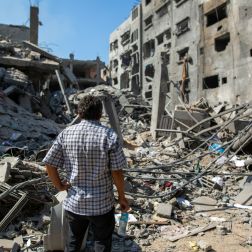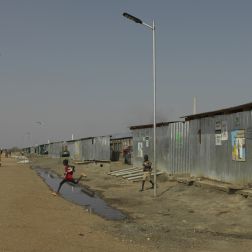- 3 mins read time
- Published: 26th April 2015
Horror not over yet for the people of Nepal
Colm Byrne, Oxfam Ireland’s Humanitarian Manager, travels to Nepal to help people affected by the devastating earthquake, he describes the horror people are going through and knows what to expect when he gets there.
People trapped under the rubble of collapsed buildings. Hospitals overwhelmed, with nowhere to put the dead bodies and forced to treat huge number of injuries outside. Homes reduced to a pile of rubble.
Roads and bridges damaged, with tons of rubble blocking the streets and alleys of Kathmandu and roads out of the capital practically impassable. Water supply pipes, electricity generating sub-stations, treatment plants – all these things vital for life are affected – and food, water, fuel and medicines in short-supply.
This what it is like to be on the ground in Nepal right now.
People are scared. Not only for missing loved ones, or their child’s next meal, or at what point in the future they might begin to recover the life they once knew, but also because of the threats that remain.

Scores of aftershocks hitting level 4 on the Richter scale following Saturday’s 7.9 magnitude earthquake means that most survivors are afraid to go into their homes because they fear more aftershocks or even another major tremor.
They have been gathering in open spaces and on roadsides, with one Oxfam colleague telling us how she saw families trying to bed down for the night on a football field.
The weather is bad and predicted to become worse. An Oxfam colleague says from now onwards people will start skipping meals and to rely on friends and relatives for support.
Some will be moving to areas they consider safer, where they will set up camps. Others will choose to stay close to their belongings and shattered homes, perhaps waiting for missing relatives. They will start selling assets in "distress sales".
They will use what food, cash and property they have just to get by. They will start borrowing. Many poor Nepalese will already be in debt.
The earthquake has struck a country that was already vulnerable. Half of Nepal’s 28m population don’t have access to proper sanitation and live below the poverty line, with around one-in-three of them in severe poverty.
Their ability to cope with a major disaster is crippled by the lack of economic and social infrastructure that people in richer nations take for granted. Many thousands of Nepalese are going to need a great deal of help. Following the earthquake, the government of Nepal has called for international assistance.
Oxfam’s team in Nepal is assessing the humanitarian needs following the devastating earthquake. We’ve already been flying in supplies. I will be there for the next month to lead the response, working with our local partners in Nepal and the Nepalese government.
We have already been working in Nepal for a number of years which means our team there are able to respond quickly, with your help. The need for donations is urgent. Providing shelter, safe drinking water and sanitation is critical.
Oxfam hopes to provide water for people from deep bore wells – most Nepalese got their water from tankers that delivered water to their homes but they can’t get through because of the destruction and rubble blocking roads.
Other urgent needs will be medicines, food supplies and restoring the power and communications infrastructure. Roads must be cleared so that vital aid can get through.
Please support the people of Nepal in their darkest hours.
Thank you.
Colm Byrne is Oxfam Ireland’s Humanitarian Manager. To support our emergency appeal, donate here or your local Oxfam shop.




